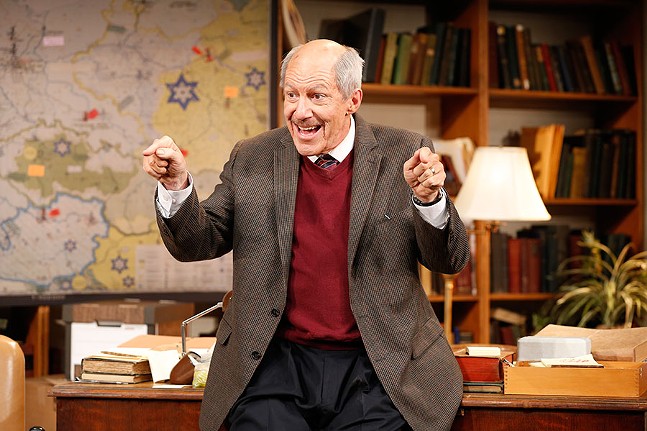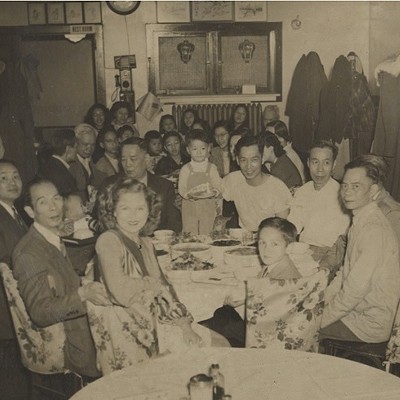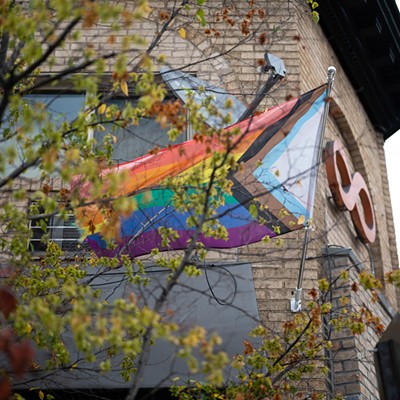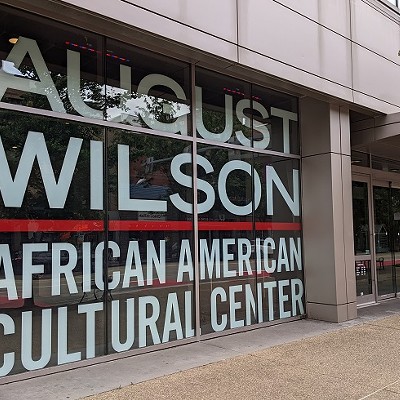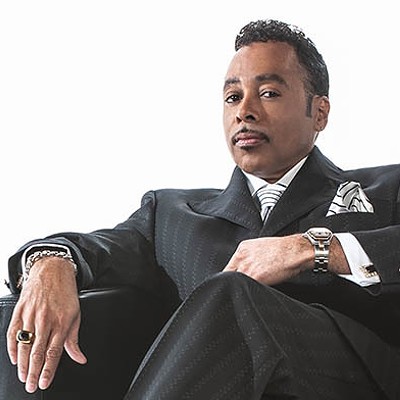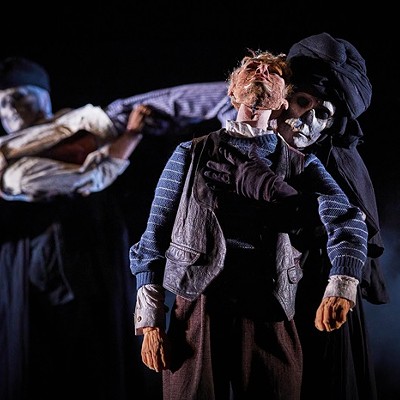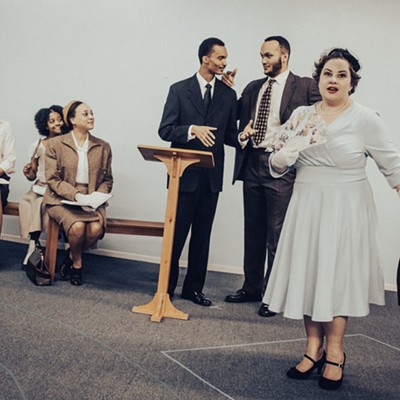Tom Dugan's play Wiesenthal (Nazi Hunter) lives up to the concise, straightforward premise of its title, but it goes far beyond that. There's unexpected humor, expected modern-day resonance, and lessons beyond politics or history. It's a true story about Simon Wiesenthal who, after surviving four years in a concentration camp, dedicates the rest of his life to tracking down Nazi war criminals who eluded capture. He wasn't in the military, his background was in architecture and stand-up comedy, not man-hunting. And yet Wiesenthal had a profound effect on post-war Europe, helping to stomp out embers of lingering anti-Semitism and Holocaust
Wiesenthal passed away in 2005 at the age of 96, but his legacy is remarkable. There's the Simon Wiesenthal Center, a Jewish human rights organization; his writings on his work, including 1961's Ich
Dugan performs Wiesenthal (Nazi Hunter) at the August Wilson Center for African-American Culture — Tuesday, March 26 through Thursday, March 28 — for a special series dedicated to the Tree of Life synagogue, with some of the proceeds to efforts to rebuild its interior.
Pittsburgh City Paper spoke with Dugan about his work, comedy, Holocaust-denial, and what it means to tie this play to the Tree of Life synagogue.
I read that Wiesenthal had a background in comedy. How did you incorporate that into writing this play?
That’s the secret weapon of the play. He was an entertaining guy. Before the war, he was an amateur stand-up comedian, he would
[Wiesenthal] understood that in order to maintain his audience’s — I don’t mean audience in stand-up; I mean in his work finding criminals and lecturing — you have to keep the audience’s attention. To tell sad story after sad story, he’s going to lose his audience. Everybody knows that. So he would mix it with levity. It’s quite a balance to do, as you can imagine. But he succeeded in it.
How has audience response changed since you started performing it a decade ago?
I would say that the main change is that, when we premiered in 2009, the audience’s perception of the play was, "Well, this is an important history lesson. Thank god we’re past intolerance, thank god we’re past antisemitism. We should make sure that it doesn’t come back." Sadly 10 years later, it is not history. It is the current state of things. It is the terrible slide away from civilization that our culture is enduring right now. So, I think the audience’s appreciation for what Wiesenthal was saying and for the cautionary tale that it is has been cranked up 100 percent.
What’s the most memorable feedback you’ve gotten from an audience member?
The one that really was impactful above and beyond anything else was a woman [in her early 20s], she stood up and asked if the story was true. She was wholly ignorant about the Holocaust. The audience was a little uncomfortable with the fact that this girl was so very ignorant about the Holocaust to ask such a question as “is this true?” I say “Yes, this is true, everything’s been checked, double checked, all the numbers are right.”
Then I said, “Why do you ask?”
She said, “Well, my parents told me that the Holocaust was a big exaggeration.” The audience is now rolling their eyes and saying "oh my god." And so, I say “Why do you think your parents would say such a thing and tell you that it was a big exaggeration?”
And she said, “Oh, because my great grandfather was Adolf Eichmann.”
What.
The audience was like blown out of their seat by that, so was I. And it was a fascinating night at the theater because one of the things that
Is the capture of Eichmann in your play?
You bet. It’s one of the juiciest parts. Wiesenthal wrote a book called I Hunted Eichmann, but he makes a very strong distinction that he didn’t catch Eichmann, but he hunted Eichmann and was at Eichmann’s trial. It’s a riveting part of Wiesenthal’s story. I often wonder what it was like for this young woman who thought her great grandfather was a vilified guy who really, was sweet, he really was a nice guy. And then to sit in the darkness in this theater and learn the truth of what her family lineage is, it wasn’t surprising to me that when she did get up to speak, she was trembling and tears were pouring down her cheeks. It must have been a horrible awakening for her. But she must have suspected it otherwise she wouldn’t have come to the show.
I was thinking about what you said about audiences 10 years ago thinking all of this was behind us. And thinking about how there’s this current revival of Holocaust denial, but Wiesenthal was dealing with it in the nearly immediate aftermath of the actual events. Like the group that believes that Anne Frank is made-up, and Wiesenthal goes to some lengths to prove it to them.
That is the last story in the play. The seeds of the Holocaust deniers were sown in the 1950s because what had happened was, many of the German soldiers and many of the SS went home after the war, had families and kids, they were ashamed of what they did. So, they just told their kids, “no it’s a bunch of bullshit. We didn’t do that. I was a hero.” They confronted the [story of] Anne Frank, they confronted Wiesenthal, saying “you’re all a bunch of liars.”
So he went about to prove that Anne Frank existed that the young people in Germany/Austria that believed that Anne Frank never even existed. They believed that the movies, the footage of the dead bodies, were all Hollywood
These performances are dedicated to Tree of Life and donating money to have it rebuilt. How did that decision come to be?
When the Tree of Life tragedy happened, I got on the phone immediately. Because, like everybody, I’m thinking “what can I do to help?” And thankfully I have a tool. So, I called [the show’s producer] and said, “we have to do a fundraiser for this synagogue. He said, “I was just about to call you.” He hopped on it right away and organized this fundraiser and a percentage of the profits, the three public performances are going directly to the Tree of Life synagogue to help rebuild. Then we also added a free student matinee where many high schools from that area are being bused in for free, to see the show because heightening awareness of the subject matter is essential in working towards having this not happen again.

